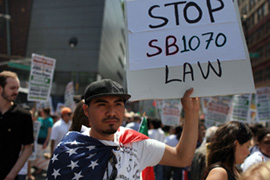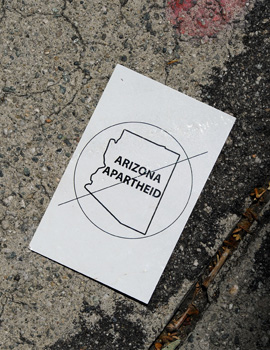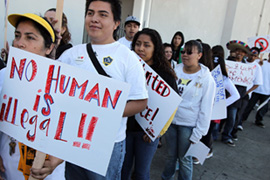‘Stupid’ law or ‘soul’ of the US?
Mark LeVine assesses the controversy surrounding Arizona’s new immigration law.

 |
| Arizona’s SB 1070 is the US’ most restrictive illegal alien law [GETTY] |
It is hard to know precisely what Arizona governor Jan Brewer’s intentions were in signing the US’ most restrictive illegal alien law, SB 1070.
One thing is for sure, she got Washington’s, and the US public’s, attention and caused one of the biggest political conflicts in years.
Most Democrats have harshly criticised the bill, with Barack Obama, the US president, Eric Holder, the attorney general, and Janet Napolitano, the department of homeland security secretary, expressing concern about the law’s legality, usurpation of federal powers, and potential for abuse.
Among the new law’s most divisive provisions are those criminalising illegal immigration and allowing police to question anyone who they have a “reasonable suspicion” might be an illegal immigrant.
‘National embarrassment’
Some Democratic politicians in Arizona have even called for a boycott of the state, while the Major League Baseball Players’ Association publicly worried about its affect on foreign players and their families.
But this is not merely a liberal versus conservative fight. Several police chiefs and mayors in Arizona have threatened either to sue to block implementation of the new law or are declaring their intention not to uphold it unless forced to.
One Arizona, sheriff, Clarence Dupnik, called it a “national embarrassment”, adding that the law was “stupid, and it’s racist”.
George Gascón, the current San Francisco and former Mesa, Arizona police chief, decried its potential “catastrophic impact” on police-community relations, while a police officer in Phoenix sued the state, claiming it would force him to ask students at the school he patrolled about their immigration status.
The outcry was loud enough that on Friday the Arizona legislature changed the language of the law to narrow the situations in which police could check someone’s immigration status from any kind of “lawful contact” to only after someone has been stopped, detained or arrested.
They also sought to alleviate critics’ concerns that it encouraged racial profiling by barring police from using race as a factor in stopping a person to check their immigration status.
Other aspects of the bill cannot be addressed merely by changing its language. The Obama administration and many legal scholars worry that the bill constitutes a “preemption” by a state to regulate immigration, which under the US constitution can only be regulated by the federal government.
On the ground, senior law enforcement officials worry that they will be overwhelmed by the costs and time involved in arresting, holding, and imprisoning illegal aliens (and what is more, the bill allows individuals to sue local governments for not doing enough to enforce it), while local businesspeople worry that the potential loss of low-cost, high-value employees – and consumers – will harm the economy.
Cost-benefit calculation
 |
| The bill has been widely criticised [GETTY] |
SB 1070 is in fact only the most recent of several Arizona laws passed in the last decade attempting to staunch the flow of illegal immigration.
Illegal aliens constitute a large and growing presence in Arizona, comprising upwards of 500,000 out of the state’s six-and-a-half million people.
What is more, if national trends are any guide, more than half of the illegal immigrant households in the state have children, three quarters of whom are likely to be American citizens by birth.
It is hard to determine conclusively the economic cost-benefit ratio associated with the presence of illegal immigrants in the US, or Arizona in particular.
Critics of illegal immigration, especially during an economic downturn, point to the cost of services they use – schools, hospitals, prisons, for example – without paying taxes, when there is scant resources to provide them to American citizens and legal immigrants.
Moreover, illegal immigrants are accused of taking jobs that Americans otherwise would hold, pushing down wages for other workers, and committing a disproportionate number of crimes.
On the other side, critics of harsh immigration policies argue that their function as a low wage workforce keeps everything from restaurant to home construction prices affordable, while pointing out that most actually pay taxes through their employers, against which they do not claim government services because of their illegal status.
More importantly, most immigrants’ rights supporters claim that the children of immigrants who are afforded a path towards legally remaining in the US have a far higher rate of education and work force participation than those whose families remain marginalised and criminalised.
What is more, rapidly escalating health care costs owe far more to an unwillingness to regulate drug prices or offer a national insurance plan than they do to the use of emergency rooms by illegal aliens.
Ultimately there would seem to be three primary motivations for the passage of such a strict law and the seemingly overwhelming support it has drawn from Arizonans: the alleged role of illegal immigrants in the upsurge in crime in Arizona and other border states, their supposed negative impact on the economy, and the contribution to the “browning of America”.
Illegals or criminals?
On the surface, it is hard to argue with the claim that illegal immigrants have contributed disproportionately to crime in Arizona.
In recent years, the state has become the “kidnap capital” of the US, second only to Mexico City worldwide with an average of almost 400 kidnappings in each of the last few years.
Other forms of crime have also risen, including teams of drug cartel hit men impersonating police and engaging in large-scale shootouts.
On the other hand, the vast majority of kidnappings involve illegal aliens, as both perpetrators and victims. They are related either to the act of entering the US illegally – “coyotes” or smugglers refuse to let their human cargo go after crossing the border until a ransom is paid – or to the burgeoning drug trade, and involve people associated with the Mexican cartels, rather than random citizens.
As for the claims that immigrants are disproportionately involved in criminality more broadly, the evidence is mixed.
Nationally, recent studies have concluded that it is either “difficult to draw any strong conclusions” about the relationship between immigration and crime, or that illegal immigrants are actually less likely to commit crimes and serve time in prison than citizens, while the cities where most of them live have seen a reduction in crime in recent years.
In Arizona, a 2008 analysis by the newspaper The Arizona Republic determined that the migrant rate of crime is proportionate to the number of illegal immigrants in the state.
Geography defeating borders
In judging the economic impact of the Mexican migration to the American southwest two reasons behind the massive influx of Mexicans have not been sufficiently addressed in the mainstream media.
The first is the historical geography of Arizona and the southwest more broadly.
From an historical perspective, the migration of hundreds of thousands of Mexicans to the southwestern US marks a return to an older geography rather than an “invasion” of foreigners with no roots.
Arizona, along with Texas, New Mexico and California, was part of Mexico until the 1840s, when the Mexican-American war saw what would become the southwestern states annexed to the US with the Treaty of Guadalupe Hidalgo in 1848.
While the population of these regions was relatively sparse, the region was inhabited by Hispano-Americans, who first settled many of the southwest’s major cities, and the new border between the two countries obscured the fact that the region on both sides has for centuries, if not longer, constituted one large ecological and economic system.
Push and pull
 |
| The bill allows police to question anyone they suspect may be an illegal immigrant [GETTY] |
Even after US sovereignty there was regular movement between peoples and these regions were part of the larger political ecology of Mexico.
In the 20th century, the rapid increase in Mexican migration north to the US was prompted as much by the “pull” of a booming US economy in need of low wage labour as it was by the “push” of an extremely poor country that could not sustain its own exploding population.
Yet for decades the movement was often two ways.
As long as workers knew they could go back and forth, their families tended to remain in Mexico, to which they returned when their often seasonal agricultural work ended.
In the last two decades the situation has changed radically, as two conflicting dynamics have come to dominate the migration dynamic along the US-Mexican border.
On the one hand there is an increasingly closed border, complete with giant walls and sophisticated sensors, and backed up by tougher measures against illegal aliens.
Ironically, these attempts to keep Mexicans out has had the opposite effect, as the risks involved in moving back and forth have meant that workers who used to come and go now often bring their families with them and never leave for fear of not getting back in.
And the increasing “illegalisation” of migrants – the new Arizona law in fact makes the mere fact of being in the US an imprisonable crime, rather than just subject to deportation – plays right into the hands of the Mexican drug cartels, for whom the black market smuggling of humans dovetails perfectly with their smuggling of billions of dollars worth of drugs.
‘Legal’ US entering
The second crucial dynamic involves the impact of Nafta, the North American Free Trade Agreement, which went into effect in 1994 to great fanfare and with the assumption that increasing the movement of goods across the border would actually reduce the flow of people, as more jobs were created in Mexico.
The reality, however, is that Nafta has had just the opposite impact on the Mexican labour force.
Nafta did not lead to the creation of the projected millions of jobs for Mexicans, while most of the profits it has generated in Mexico have either been repatriated to the US or kept by the country’s wealthy elite.
Moreover, Nafta’s reduction of agricultural tariffs devastated poor Mexican farmers, who could not compete with subsidised US farmers, while the arrival of super stores like Walmart brought ultra-cheap goods to Mexico produced by even more inexpensive Chinese labour, against whom Mexican workers cannot compete.
This dynamic is one of the primary causes of the huge pool of migrant labour who have no choice but to search for work in the US as the only escape from what poor Mexicans describe as their Nafta “death warrant”.
And these Mexican migrants come to border states like Arizona, which according to a 2006 Economic Policy Institute study lost twice as many jobs as they produced because of the free trade regime.
Yet advocates of strict immigration policies focus on illegal immigrants entering the US rather than the entrance of US corporations into Mexico which, while ‘legal’, has far more damaging consequences than those caused by undocumented Mexican workers north of the border.
‘Soul’ of America
 |
| Tougher laws reflect the ascendance of an ultra-nationalist conservative wing [GETTY] |
In supporting the new Arizona law, Washington Post columnist George Will explained that: “In the practice of the complex and demanding craft of policing, good officers – the vast majority – routinely make nuanced judgments about when there is probable cause for acting on reasonable suspicions of illegality.”
But a Phoenix-based immigration attorney, Alex Navidad, who regularly deals with local police had a different take, explaining that: “The law’s biggest impact is going to be on relations between the police and the immigrant community. It’s putting a higher burden on young cops; it’s not like they’re college grads, and you’re asking these young kids to make these calls, and very often they are going to make the wrong call.”
Navidad’s fear of damaging community-police relations is shared by Obama, who as an African American who spent years in Chicago no doubt has had enough experience with police to know better than George Will.
Race, it is clear, is crucial in determining whether one trusts the police, and government more broadly, to deal with one fairly.
Brown-skinned immigrants look at the largely white police forces, state government and border patrol, and fear for their rights and even safety.
Whites look at immigrants and see a threat to their security, jobs and even lives, while the larger anti-immigrant movement epitomised by the Tea Party look at the White House today and have a similar response.
Ultimately, Tuscon-based attorney Vikram Badrinath told me, the goal of this latest legislation is to keep immigrants “in the shadows”.
When people are fearful, like black Americans before the civil rights era, they do not vote, they do not use government services, they do not participate in the public sphere, and they do not raise their voices and use their talents to build a broader and more pluralistic culture.
California congressman Duncan Hunter perhaps put it most clearly when he was asked, after the bill’s passage, whether he would support the deportation of natural-born American citizens who are the children of illegal aliens.
His answer: “I would have to, yes … It takes more than just walking across the border to become an American citizen. It’s what’s in our souls.”
He holds this stand even though it is in direct opposition to the 14th amendment of the US constitution which he is sworn to uphold (he has co-authored at least five bills in congress that have attempted to overturn this provision).
Indeed, one of the reasons that enforcement of already tough immigration laws in Arizona and the other border states (most of which have Republican governors) has until recently been lax is that the Republican Party’s pro-business wing has traditionally not supported tough enforcement, since low wage illegal workers are a boon to business owners.
But with the ascendance of the Party’s ultra-nationalist, ideologically motivated Tea Party wing, they are far more concerned with saving America’s “soul” than with the wallets of the Republican upper class.
And the only way to do that is to try everything possible to maintain the dominance of the country’s soon-to-be white minority – by 2042 non-whites, of which the largest group are hispanics, will constitute the majority of the country’s population.
This is another reason why the Tea Party and other conservatives are so invested in proving that Obama is not a “natural born” US citizen, and why they have gone so far as to carry automatic weapons in front of the White House in protest against not merely the nation’s first black president, but against the “browning” of the US more broadly.
‘Browning’ of US
Arizona Governor Brewer’s crusade against illegal aliens needs to be understood in this context.
In fact, a 2008 investigation commissioned by the magazine Rolling Stone determined that in 2004, then Secretary of State Brewer initiated a campaign to revoke the voter registration of alleged illegal aliens that wound up removing at least 100,000 voters from Arizona’s rolls, the vast majority of them hispanic.
When a federal prosecutor was sent to investigate, he found not one case where a rejected voter registration actually owed to an illegal alien falsely attempting to register (indeed, the idea that an illegal alien would risk federal imprisonment and certain deportation merely to vote is almost laughable).
Ultimately, solving the complex problem of illegal immigration will be impossible regardless of how militarised the border and criminalised the immigration system become.
It will require a major change in the structure of economic relations between Mexico and the US, and a radical reorientation of drug policy that will likely prove impossible to implement politically because a large share of the political and economic elite on both sides of the border benefits from the current situation, even if publicly they rail against it.
Until Americans are willing to confront the hypocrisy, half-truths and broken promises that have characterised the war on drugs, Nafta, and illegal immigration, and the fact that the US is inexorably becoming a country of colour, the people of Arizona, and the illegal immigrants with whom they so problematically share their state, will continue to suffer.
Mark LeVine is currently visiting professor at the Center for Middle Eastern Studies at Lund University, Sweden. His books include Heavy Metal Islam: Rock, Resistance, and the Struggle for the Soul of Islam and Impossible Peace: Israel/Palestine Since 1989.
The views expressed in this article are the author’s own and do not necessarily reflect Al Jazeera’s editorial policy.